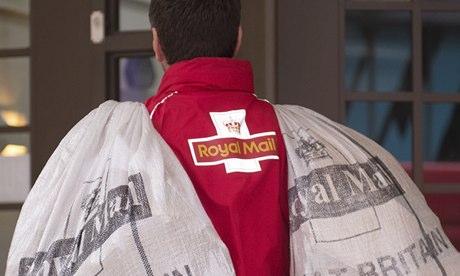Royal Mail warns of job losses after sell-off
Wed Oct 09, 2013 3:03 pm
Royal Mail has warned that more postal workers will lose their jobs following its controversial privatisation.
On Tuesday the 500-year-old national institution saw unprecedented demand for its share offer, with more than 1 million people thought to have applied. In its written submission to parliament on Wednesday, Royal Mail said: "The company will employ fewer people in the future, whoever owns it."
The company refused to state how many of Royal Mail's 150,000 employees will be axed.
Moya Greene, Royal Mail's chief executive, who was paid £1.6m last year, has said the company needs to be "sized appropriately for the [declining] traffic we have to process".
The forthcoming cuts come on top of 50,000 jobs lost over the past decade. The company said it "remains committed to the overarching objective of achieving this without compulsory redundancies".
"Over the past decade, the postal services sector has changed dramatically. A decline in mail volumes has coincided with the liberalisation of the market and the emergence of competition. In recent years, we have seen a significant increase in the number of parcels being sent. All of this has meant a difficult process of change for our people," Royal Mail said in its submission to the business, innovation and skills select committee.
"Many of Royal Mail's employees have seen changes to their working practices as the company has adapted its operations to the changed mix of mail. Change will continue and the company will employ fewer people in the future, whoever owns it."
Royal Mail workers, who are 96% opposed to the privatisation, continued their campaign against the sell-off with a protest outside parliament ahead of committee meeting. Activists dressed up as highway robbers carried banners saying: "The Great British Royal Mail Robbery".
Vince Cable, the business secretary in charge of the sell-off, was giving evidence to MPs on Wednesday. Ahead of the hearing, the government said its main objective was to secure the universal postal service, which guarantees deliveries to every address in the UK, six days a week, for the same price: "Privatisation will allow the company to innovate, invest, improve our services, win new business, deliver the high-quality universal service, and continue to be a very substantial employer in the UK."
The government has been overwhelmed with public orders for shares in Royal Mail, up to 70% of which will be floated on the stock exchange on Friday morning. The shares are expected to rise instantly, by a speculated 20-40%.
The government will collect about £2bn from the sell-off, but Labour claims the coalition massively undervalued the company and could have made hundreds of millions more for taxpayers.
Re: Royal Mail warns of job losses after sell-off
Wed Oct 09, 2013 3:55 pm
Not exactly unexpected was it?
Re: Royal Mail warns of job losses after sell-off
Wed Oct 09, 2013 4:57 pm
It's not just a loss of post office jobs though, it's the end of the postal service as we used to know it.
Re: Royal Mail warns of job losses after sell-off
Wed Oct 09, 2013 5:26 pm
Sadly the people will wake up far too late to realise just what is going on.
I did write to a certain Mr Ainsworth about this.
I did write to a certain Mr Ainsworth about this.
Re: Royal Mail warns of job losses after sell-off
Fri Oct 11, 2013 10:56 am
Royal Mail shares jump sharply on market debut
Royal Mail shares rose more than 38% to 456p at the start of conditional dealings on the London Stock Exchange.
The hugely oversubscribed sale was priced at 330p per share at the top of its expected range and valuing the near 500-year-old company at £3.3bn.
After an hour into trading, the price had eased back to 444p. Private investors received 227 shares each.
The shares are listed officially next Tuesday, but City institutions began conditional dealings on Friday.
Some 10 million shares were traded in the first 30 seconds when the market opened. Stockbroker Hargreaves Lansdown reported that its website was having "intermittent problems" due to the "unprecedented interest" in Royal Mail.
Tom McPhail, the firm's head of pensions research, said it was "extremely sorry for the delays", but was making "significant progress in clearing the backlog" and hoped to have all systems running normally again soon.
"We have experienced demand this morning which has gone off the scale," he said.
"We now have six times the normal number of staff working on our dealing lines. We know we are not the only broker affected by such problems this morning."
The price rise is likely to fuel debate over whether the sale of Royal Mail has been undervalued. Business Secretary Vince Cable has insisted that the taxpayer has not been short-changed by the privatisation.
But the general secretary of the Communication Workers Union, Billy Hayes, described the sell-off as "a tragedy" and predicted that it would make "not one scintilla of difference" to employees' intention to vote for strike action next Wednesday.
Mr Hayes told BBC Radio 4's Today programme: "This is a sham, really. The company has been undervalued.
"It's basically David Cameron rewarding his mates in the City. Vince Cable, one of the cleverest men in British politics, has made one of the stupidest decisions he is ever likely to make as a politician."

Re: Royal Mail warns of job losses after sell-off
Fri Oct 11, 2013 11:38 am
Royal Mail shares rose more than 38% to 456p
Re: Royal Mail warns of job losses after sell-off
Sat Oct 12, 2013 12:59 am



